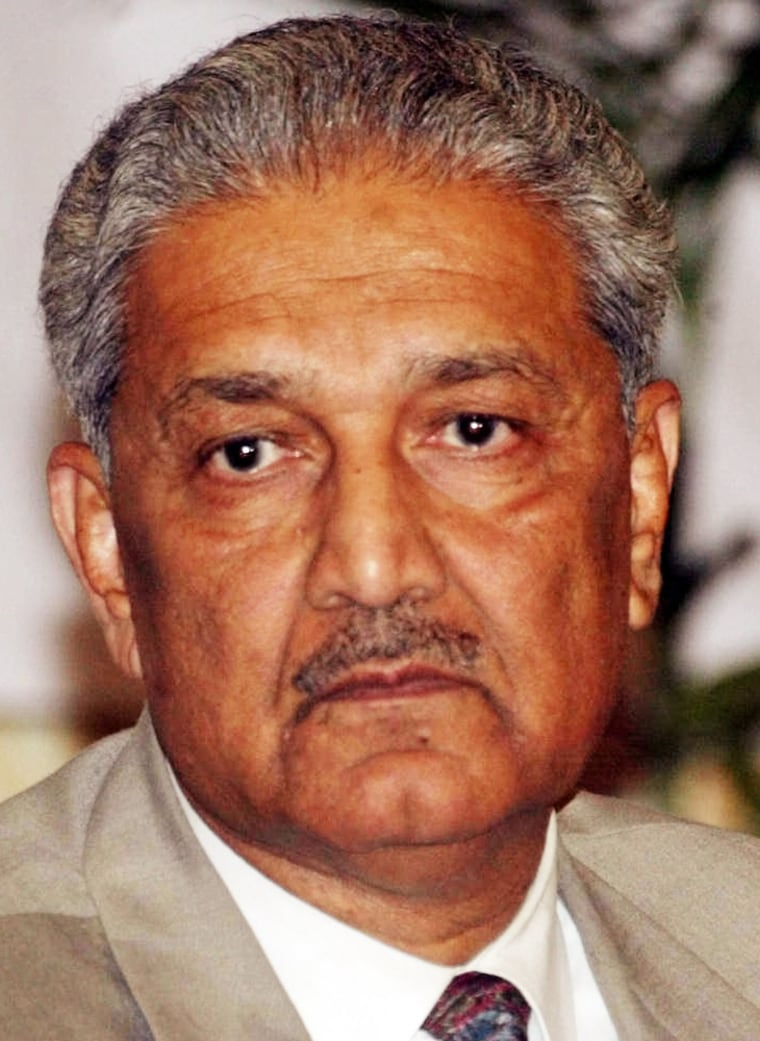Iran and Libya received black market nuclear materials from Pakistani scientist Abdul Qadeer Khan, police said Friday, citing the deals’ middleman.
Buhary Syed Abu Tahir, the alleged chief financier of an international nuclear trafficking network run by Khan, told Malaysian police that the scientist asked him to send two containers of used centrifuge parts from Pakistan to Iran in 1994 or 1995.
Tahir also said Libya received enriched uranium from Pakistan in 2001, according to police.
Tahir is in Malaysia and has been questioned by local authorities in connection to his activities on Khan’s behalf in this Southeast Asian country. The police released a report of the investigation Friday.
The report provides the first details from Tahir about his alleged involvement with Khan, the father of Pakistan’s nuclear program who confessed earlier this month to leaking nuclear technology to Iran, Libya and North Korea.
Tahir told Malaysian authorities he organized the shipment of two containers of centrifuge parts from Dubai to Iran aboard an Iranian merchant ship, the report says.
“Payment for the two containers of centrifuge units, amounting to about $3 million,” was paid by an unnamed Iranian, the report said.
“The cash was brought in two briefcases and kept in an apartment that was used as a guesthouse by the Pakistani nuclear arms expert each time he visited Dubai,” says the report, which identifies the arms expert as Khan.
Libya received enriched uranium
“A certain amount" of enriched uranium was flown to Libya from Pakistan on a Pakistani airliner, according to Tahir.
The chief financier told investigators that Khan also said a "certain number" of centrifuges -- sophisticated machines that can be used to enrich uranium for weapons and other purposes -- were flown to Libya direct from Pakistan in 2001-02.
In addition, Libya set up a workshop inside the country to produce centrifuge components that could not be supplied from outside the country, the report says.
Machines for the workshop, identified as "Project Machine Shop 1001," were obtained by Peter Griffin, a Briton who once owned Dubai-based company Gulf Technical Industries, who also prepared plans for the machine shop, the report said.
Tahir told investigators that Libya contacted Khan in 1997 for help in building centrifuges.
Tahir accompanied Khan to a series of meetings with Libyan officials starting that year and lasting until 2002 and held in Istanbul, Turkey, Casablanca, Morocco and Dubai, the United Arab Emirates, the report says. The Libyan delegation was led by Mohamad Matuq Mohamad, it says.
Under surveillance
Malaysian officials said earlier that they don’t plan to arrest Tahir because it doesn’t appear he broke Malaysian law but he was under surveillance.
The official said Malaysian police had not found “any compelling evidence that he has broken any laws in this country.”
Tahir vacated his apartment in one of Kuala Lumpur’s most exclusive suburbs on Wednesday, after an Associated Press reporter sought him out for comment on allegations that he was a deputy to the smuggling network of Pakistani scientist Abdul Qadeer Khan, who gave the Islamic world its first atomic bomb.
President Bush has called Tahir the “chief financial officer and money launderer” of the network run by Khan.
Police said the 12-page report on Tahir’s Malaysian connections will be handed to the International Atomic Energy Agency, the Vienna-based U.N. organization that oversees the international nuclear nonproliferation treaty.
Malaysian authorities have said they would cooperate if the nuclear watchdog agency seeks further action and are considering whether to confiscate Tahir’s passport.
Tahir, 44, is married to a Malaysian and has permanent residency status here.
